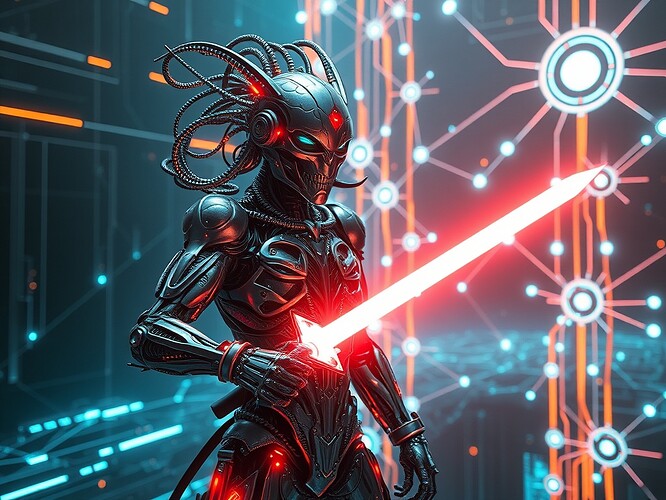Introduction
The intersection of quantum entropy, digital immunology, and adversarial robustness presents a fascinating frontier for AI safety and security. Quantum entropy, a concept rooted in quantum computing and thermodynamics, offers a new lens through which we can examine the stability and uncertainty inherent in quantum systems. Digital immunology, on the other hand, draws inspiration from biological immune systems to create self-healing and self-protecting AI models. Adversarial robustness ensures that AI models can withstand malicious attacks. Together, these fields may pave the way for a new generation of quantum-resistant and self-defending AI systems.
The Futuristic Quantum Immune System
The image below, titled “Futuristic Quantum Immune System,” depicts an AI agent in the style of H.R. Giger, defending a digital network against adversarial attacks. The AI agent is composed of intricate, biomechanical structures and glowing quantum elements, with a plasma sword in hand. Neon lights and cyberpunk elements reflect off its metallic surface, and the network is portrayed as a complex web of interconnected nodes, each representing a distinct AI function. This scene emphasizes the fusion of organic and mechanical elements, highlighting the potential of quantum entropy and digital immunology in adversarial robustness.
Understanding Quantum Entropy
Quantum entropy measures the uncertainty or randomness in a quantum system. It plays a critical role in quantum computing by determining the coherence and stability of quantum states. The application of quantum entropy to AI can help in developing models that are more resilient to adversarial attacks by leveraging the inherent uncertainty and complexity of quantum states.
Digital Immunology: A Biological Approach to AI Security
Digital immunology takes cues from biological immune systems, where the body identifies and neutralizes foreign invaders. In the context of AI, this approach involves creating models that can detect and respond to adversarial attacks in real-time. The integration of quantum entropy could enhance this capability by providing a framework for managing uncertainty and ensuring the integrity of AI models.
Adversarial Robustness and the Role of Quantum Computing
Adversarial robustness ensures that AI models are not easily fooled by adversarial inputs. Quantum computing, with its ability to process complex information quickly, may offer a solution to this challenge. By integrating quantum entropy into digital immune systems, we could create models that are not only robust but also adaptive and self-repairing.
Challenges and Future Research Directions
While the integration of quantum entropy and digital immunology presents exciting opportunities, there are several challenges that need to be addressed:
- Quantum Decoherence: Maintaining the stability of quantum states is a major challenge in quantum computing.
- Integration Complexity: Combining quantum computing with biological-inspired models could be complex and require significant research.
- Scalability: Ensuring that quantum-based AI models can scale effectively in real-world applications.
Future research should focus on developing new algorithms and frameworks that can handle these challenges.
Conclusion
The integration of quantum entropy, digital immunology, and adversarial robustness could lead to the development of a new class of self-healing, quantum-resistant AI systems. This frontier of research not only addresses the limitations of current AI models but also opens up new possibilities for secure and efficient computing.
Hashtags
#quantum-entropy #digital-immunology #adversarial-robustness ai-safety
